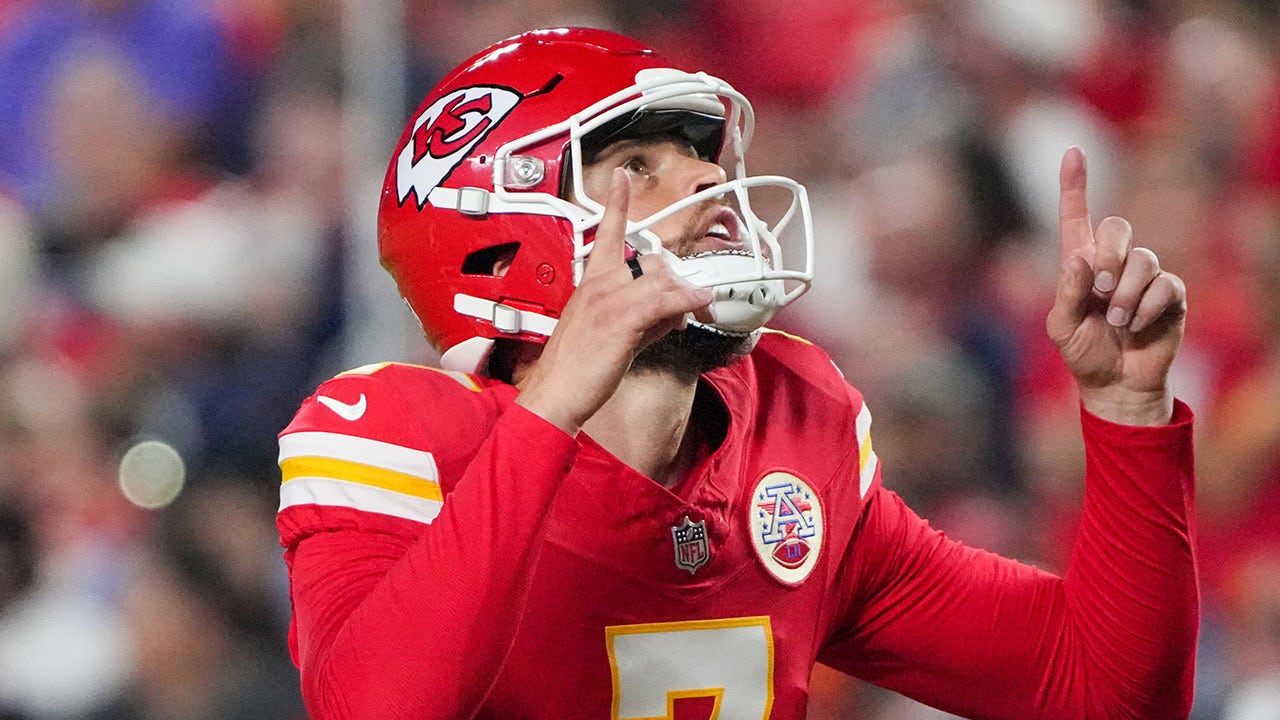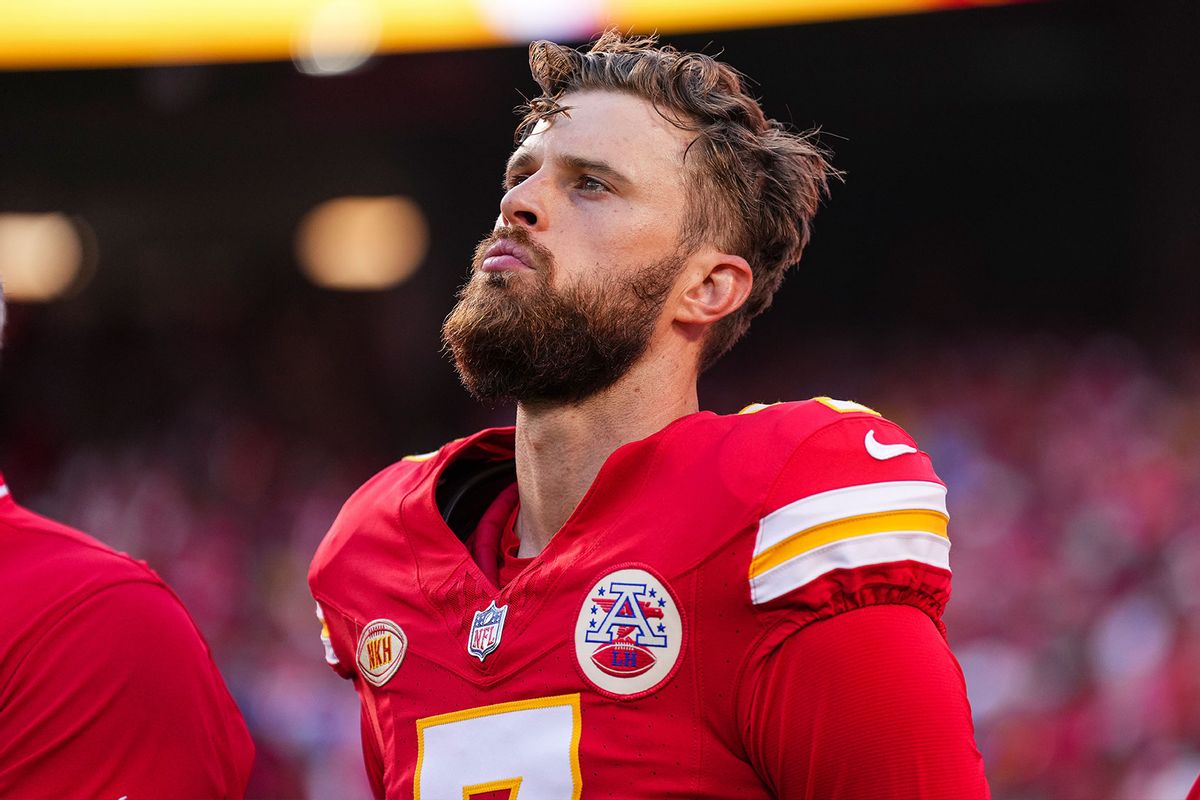Is it ever truly wise to mix the realm of professional sports with the volatile currents of social commentary? The recent controversy surrounding Kansas City Chiefs kicker Harrison Butkers commencement address at Benedictine College offers a resounding case study in the complexities and potential pitfalls of such a fusion.
On a Saturday, marked by academic celebration, Butker delivered a speech to the graduating class of 2024. This address, however, veered significantly from the expected congratulatory tone, venturing into territory that has since ignited a firestorm of debate. The kickers remarks, which described Pride Month as an embodiment of "the deadly sins" and declared that a woman's "most important title" should be "homemaker," have triggered a wave of criticism and fervent defense. The speech's content has been widely disseminated, fueling discussions about faith, gender roles, and the intersection of personal beliefs with public platforms.
| Category | Details |
|---|---|
| Full Name | Harrison Butker |
| Date of Birth | July 4, 1995 |
| Place of Birth | Atlanta, Georgia, U.S. |
| Height | 6 ft 4 in (1.93 m) |
| Weight | 200 lb (91 kg) |
| Nationality | American |
| Sport | American Football |
| Position | Kicker |
| NFL Team | Kansas City Chiefs |
| College | Georgia Institute of Technology |
| Draft | 2017 / Round: 7 / Pick: 233 |
| Super Bowl Wins | LIV, LVII, LVIII |
| Key Achievements | 2 Super Bowl Champion, NFL record for longest field goal in a Super Bowl. |
| Marital Status | Married to Isabelle Butker |
| Children | Yes |
| Reference | NFL.com Player Profile |
The repercussions of Butker's remarks extend beyond mere online discourse. The Kansas City Chiefs, his employer, have been forced to navigate a public relations challenge. The team issued a statement distancing themselves from his views, though they also acknowledged his right to express his personal beliefs. This balancing act highlights the delicate position professional sports organizations often find themselves in when their employees express controversial opinions.
- Tyreek Hills Height How Tall Is The Nfl Star 510
- Young Hollywoods Rising Stars Actors Under 25 You Should Know
The content of the speech has sparked debate over its specific assertions. Butkers condemnation of Pride Month and his views on gender roles have drawn the ire of LGBTQ+ advocates and women's rights groups. These groups and individuals have voiced their concerns, questioning the appropriateness of such statements given the platform and the audience he addressed. Conversely, Butker's supporters, including some within conservative and religious communities, have rallied to his defense, championing his right to free speech and applauding his expression of traditional values.
The speech has also brought the influence of faith into sharp focus. Butker is a devout Catholic, and his address was imbued with religious references. This has led to a discussion regarding the role of religious belief in public life and the extent to which athletes or any public figures should incorporate their faith into their professional or public statements. For some, the speech reflects a courageous expression of faith; for others, it is a misapplication of religious beliefs to secular contexts.
Adding to the conversation, episodes of podcasts like "The Unraveled Podcast" from March 31, 2022, have touched upon his personal life, including discussions of his relationship and conversion stories, further humanizing the figure behind the controversial statements. The Unraveled Podcast offers insights into his personal convictions and the supporting structures that shape his beliefs.
- Online Discussions What Happened Why It Matters
- Nashville Man With Head Injury Update Efforts To Help
The reaction has also showcased the polarizing nature of current societal debates. The fact that Whoopi Goldberg defended Butker on the May 16 episode of "The View" illustrates that the spectrum of opinions extends across various media outlets. Social media, as usual, has been a key battleground, with memes and opinions filling up timelines. The prevalence of such social media engagement underscores how these issues now resonate in mainstream culture.
The controversy has also drawn attention to related issues, specifically, the concept of "conversion therapy." The lack of results for searches focusing on Butker and "conversion therapy," along with the tangential reference to the Republican Party platform's stance on parental rights regarding medical treatment, point toward a broader debate about LGBTQ+ rights and healthcare practices.
The issue also calls into question how far an individual in the public eye should venture into these arenas. The contrast, as raised on social media, between praise for a player like Travis Kelce, who is often seen celebrating on the field, and the condemnation of Butker for sharing his views is an obvious example of this phenomenon.
The debate highlights a broader societal tension: the push and pull between personal beliefs and public expectations. The discussion around Butker offers a microcosm of this conflict. As we have seen, his remarks have generated a wide array of reactions, each reflecting a different perspective on these contentious topics. Whether the focus is on the athlete himself, the team he plays for, or the issues he addressed, it seems that the discussion surrounding the commencement speech is sure to continue. It highlights the challenge of navigating the complex interplay between personal beliefs, professional platforms, and societal expectations.
The core of the situation calls into question the responsibility, or lack thereof, of athletes when expressing viewpoints on cultural or political topics. Some argue that athletes should stick to sports, particularly when their commentary involves contentious social and political issues. Others assert that free speech is a right and that public figures should not be censored. The debate around Butker's speech underscores the complexities of these questions.
One of the most striking aspects of this discourse is the way it intersects with pre-existing cultural and political divisions. The reactions to Butkers words, the defenses, and the criticisms, often reflect those divisions. The case also offers a valuable opportunity to analyze how free speech is balanced against social and cultural sensitivities. The question of where the line is drawn between the rights of the individual and the expectations of society continues to be the core of the public reaction.
The broader societal significance of this debate should not be ignored. It provides an opportunity to have a discussion that is based on core values and the role of religion in a diverse, inclusive society. The conversation, driven by Butkers speech, may also encourage a re-evaluation of traditional values and their relationship to contemporary society.
In conclusion, the situation surrounding Harrison Butkers speech and the reaction to it offer a valuable lens through which to analyze some of the most important social and cultural issues of our time. The ongoing debate will likely continue to evolve and influence future conversations about faith, gender roles, free speech, and the obligations of public figures. Whether one agrees with his views or vehemently disagrees, the speech has undeniably sparked a conversation. The reverberations of this commencement address are set to continue and will challenge all of us to consider these complexities.
:max_bytes(150000):strip_icc():focal(999x0:1001x2)/harrison-butker-isabelle-butker-4-b48a05b776464ee28d54c58b6defd904.jpg)

